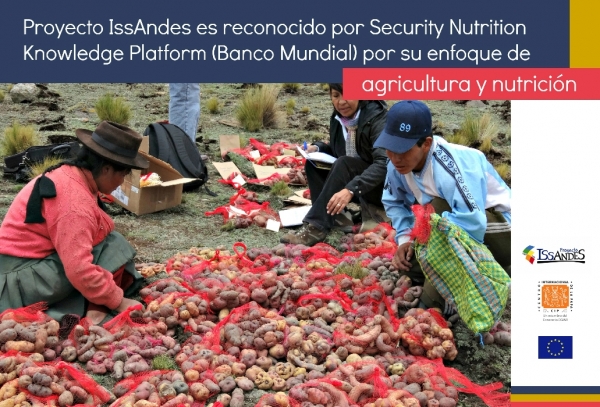Honorable Mentions to Innovation for Food Security and Sovereignty in the Andes (IssAndes)

On 06 June, the "Innovation for Food Security and Sovereignty in the Andes" (IssAndes) project received an Honorable Mention in the 2013 Harvesting Nutrition Competition organized by the SecureNutrition Knowledge Platform’s supported by the World Bank. The aim of this competition is to collect and highlight success stories of projects that seek to bring nutritional approaches to agriculture and food security. The contest attracted 50 submissions for projects around the world, of which the top three winners are projects in Africa.
The panel of five judges comprised of representatives from the organizing institutions (The Security Nutrition Knowledge Platform’s, GAIN and Save the Children) decided to give IssAndes an honorable mention to find in their results and project approach, "an impressive potential for its impact on nutrition, scaling and innovation." Significantly, IssAndes is the only project in Latin America that has been rewarded.
The IssAndes project of the International Potato Center and funded by the European Union, is active in Peru, Bolivia, Ecuador and Colombia. In particular, IssAndes is working in Peru in the departments of Apurimac and Huancavelica with various research and development institutions. In Apurimac it is working with CARE Peru and CAPAC Peru, and in Huancavelica with PRISMA and ADERS Peru. Also, the Institute for Nutrition Research (IIN) and various research programs with CIP are involved in the project. For the implementation of the various activities, IssAndes articulates with different actors both in the public and private sector, both nationally and in the specific regions where actions of this project are taking place, ensuring the sustainability of the achieved results.
IssAndes promotes the interaction between agriculture and nutrition as a key factor in rural areas. Interventions the project promotes are aimed at generating results according to the five dimensions of the problem: availability (native potato varieties with higher yield and quality); access (income improvements for the quality of production); use (native potatoes with higher content of zinc and iron); stability(better responses to pests and diseases and climate change); institutions (committed public spaces and support laws).
- Harvesting Nutrition Competition Website: https://www.securenutritionplatform.org/SuccessStories/Pages/SNHN.aspx
- IssAndes Project Website: www.issandes.org
- IssAndes Project Facebook: www.facebook.com/papaesnutricion

Facebook comments